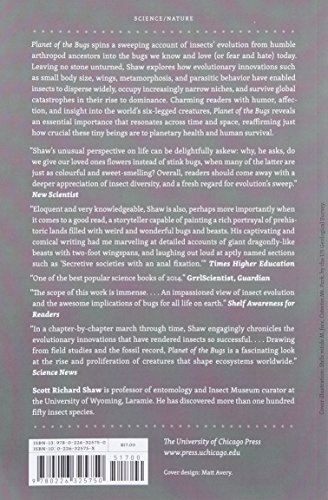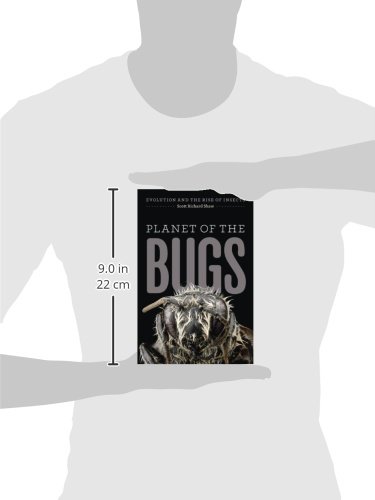



Planet of the Bugs: Evolution and the Rise of Insects
K**H
Loved this book
I got this as a suggestion from Scott Shaw as he taught my insect biology class in college. This book is great for the general public and a great viewpoint on insect evolution.
T**Y
An evolutionary journey with a focus on bugs
Author Shaw takes us through the evolution of life on Earth with a focus on insects specifically and arthropods generally. Of course for some two billion years or more there were no arthropods, only single cell creatures. Multi-cell organisms didn't appear until about a billion and a half years ago. It was the Cambrian Period explosion that brought so many phyla, into existence. Trilobites, arthropods, were everywhere, and were prolific and were survivalists, enduring until the end of the Permian Period, 252 million years ago, which is almost twice as long as the dinosaurs, not then in existence, lasted. Anomalocaris was the great white shark of the Cambrian seas. Pikaia also swam in those seas. It wasn't an arthropod. It was a creature that would give rise to our own phylum, Chordata.,though it didn't have a backbone.Shaw covers the age of dinosaurs, during the Mesozoic Era. He finds a role for insects even here. Maybe, he postulates, large herbivorous dinosaurs accidently ate insects, a supplemental food source, when they dined on conifers and cycads. And maybe baby dinosaurs intentionally preyed on insects.Insects today are diverse taxonomically and numerically. So many species of beetles and wasps, for instance. Maybe numbering in the millions. To put that into perspective, let me say that there are about 6,000 mammal species in existence now. And, BTW, about a quarter of them are bats. Bats certainly have a role to play with insects.Shaw figures, as I do, that there's life all over the universe. Primitive life to be sure, maybe at the single-cell stage. To get beyond that in evolution there needs to be fortuitous events, like what happened on Earth 66 million years ago when a bolide struck our planet and wiped out many life forms, including all dinosaurs except birds. Yup, birds are the dinosaur descendants. Shaw figured complex life on other suitable planets might only get to the level of insects, not an unreasonable assumption.
J**K
A good book on a grade 2 level
If you're an entomologist, this book's going to be too elementary. If you're someone, like I, who's had a lifelong interest in insects - O, I admit it, arthropods in general* - you will also find it elementary. But it's a great review of all the books you've ever read about insects. I.e., an elementary book is often fun and informative. It's organized according to the geologic ages of the earth, tracing the development of arthropods in each era. Therefore it's a also a great review of the history of life on age and a simple way to try (once again) to memorize the terminology. This an obvious and helpful organizing principle. By the end of the book you'll know the dates of the cambrian and cenozoic, but will you remember them three months later? I recommend it as a review for hobbists like me. Also for intelligent young people.I think folks just beginning to consider the facts of insect life will also find it a very good introduction. There's a theme which gets a little old thruout about how the epochs as generally described are vertebrate-centric, which though tiresome would certainly seem true to a visitor from another star.On a more critical note, I found some of the "evolutionary causes" which are ohsopopular these days were pretty questionable. Did Tribolites really die out because they found it hard to molt? Did insect wings evolve as a gliding mechanism? I think this is a minor failure, but tyros are likely to take such speculation as "science" rather than speculation. But the world will continue in its orbit.I finished this book on a chaiselounge in the warm sun of an autumn day. Surrounding me and minding their own business were members of at least half a dozen orders of insects, butterflies, late working bees of several types, swarms of thousands of tiny midges shining in the sun, grashoppers and several non-annoying and attractice fly species to name those on the top of my head. As I closed the book, I felt very connected. If you're interested in bugs, their evolution and their relatiuonships, it's an enjoyable read. (maybe I should mention my relationship with insects is also personal, I keep bees.)PS, a really fine academic work, Evolution of the Insects, was published by Cambridge three or so yrs ago. Probably now available at a good discount. If I wanted a library on bugs, this would have to be the central work (and is).*here's a tip: don't introduce crayfish to your aquarium
C**H
Full of Gaps and Potted Dinosaurs
Terribly Disappointing and Annoying.Full of gaps, trilobites, potted dinosaurs, author’s poetry and disjointed ramblings. Not very much about “Evolution and Rise of Insects” .A 200 page book could do a decent stab at Insects’ evolution. This is not it.It lacks the basic diagrams completely : family tree and time line.It ignores entirely their two main vertebrate predators in the early Mesozoic : Pterosaurs in the air and Mammals on the ground.It spends page after tedious page on potted dinosaur factoids (Brontosaurus vs Apatosaurus; Jurassic Park was really Cretaceous). It imagines dinosaurs carefully eyeing insects on the plants they were about to eat, and being driven to extinction by them.The tremendous story of the Evolution of Insects since the Dinosaurs is skipped over completely in favour of his poetry, his field trip in the jungle, his comments on man’s lucky survival as a species, his standard eco warnings, and his absurd views on buggy life from space.
D**B
birth of the carpet crawlers
Very readable and interesting account of the evolution of insects from the cambrian period onwards.Makes a couple of very interesting points. The author argues that insects colonised the land before plants and animals. He shines a light onto a dark crevice to expose our creepy crawly co-inhabitants and the story of insect evolution. It would perhaps have been better with more explaination of the fossil record and maybe a slight detour into the story of the eight legged arachnids but nonetheless this book is highly recommended and the biology is fascinating.
D**H
Interesting outline of arthropod evolution
I enjoyed the book. Some people might find his constant references to the negative aspect of our anthropomorphic view of life and it's evolution refreshing but others might easily tire of it. My view? Say it once then leave it alone.
L**R
Five Stars
An excellent review of insect life by an enthusiast and very readable.
J**.
Five Stars
Excellent
Trustpilot
2 weeks ago
2 months ago